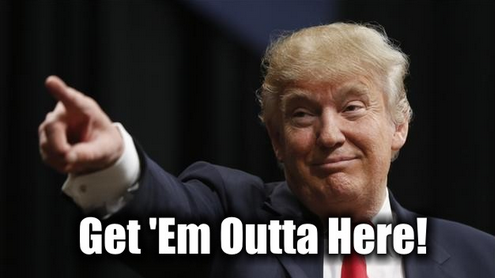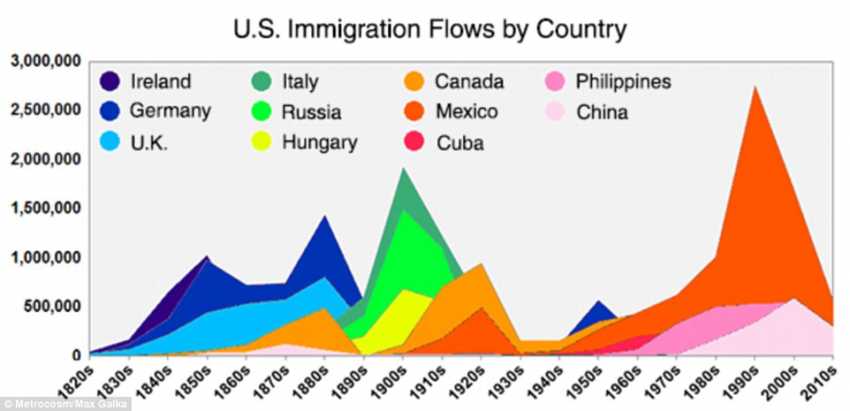Love the United States? Thank an immigrant. If it wasn’t for an immigrant- you probably wouldn’t be here. Except, if you are Native American. The rest of us, though, our roots go back to other continents, some earlier than others. In the United States I am the first generation of immigrants and in Canada I can trace my roots back to 1642. I am born of immigrants in both countries and I am an immigrant to the United States. Recently, my mother had her DNA analyzed and there were some surprises, we had always thought we were from France because we can trace all of the branches on my mother’s side to France, one branch all the way back to the 12th century, but it turns out that we are mostly British. For us it was fascinating and interesting. Ancestry.com gives one a detailed packet of information when they send the results of the test. We were not as upset, though, as poor Mr. Craig Cobb who found out he has 14% Black DNA. You may remember he was the man trying to buy property in Leith, North Dakota where he tried to create his very own paradise, an all-white supremacist community.
Being an immigrant myself I watch with interest the conversations and debates we have in this country on how immigrants should be treated, who we should allow to live or work here and if we should let one group of people enter and why we should not let another group come here at all. If we do let them, how should they act, what jobs can they do, what language they should speak and if we should accommodate them at all or expect them to figure things out on their own? Our relationship status with immigrants? It’s complicated. When we allowed ourselves to accept and erect the gift of Lady Liberty from France we may not have fully understand the consequences. On the one hand we have proudly proclaimed ourselves a melting pot but on the other hand every new group that wants to come and melt with us has been maligned. We have a love/hate relationship with other nationalities. We proclaim proudly that we are Irish-American or Italian-American yet we look down upon the new nationality trying to follow the very same path our parents and ancestors did.
Most Americans consider our treatment of Americans of Japanese descendants during WWII as a dark moment in our history, yet some are preparing and considering doing the same thing to another group of people. Despite our social dialogue and prideful banter of being ‘Something-American’ we are quick to exclude others. As DNA sampling becomes more and more available to people, we may have to adjust our self-proclaimed ancestry and perhaps focus on, just being human beings. Two things seem to divide humans above most any other things- money and group identification. We judge, fight and kill over these two classifications more than any other issues. Perhaps it is time we considered ourselves citizens of the same single precious planet. Despite our best efforts we have not found any other place to live. The wonder of technology is bringing us closer and closer together. We can see instantly what other people are doing around the globe and share in their joys and frustrations. “Je Suis Charlie”, remember how easily we declared ourselves? Let’s try, “Nous sommes humains” (we are human) and see how that feels.
We all desire the same things, a safe place to live, adequate food, hope and opportunity for our children and the future. Yet we seem so easily capable of denying this to others who are ‘not us’. We are engaged in a social discussion right now about whether or not Black Lives Matter or Blue Lives or All Lives or if we should allow Mexican people to continue to live and work here or should we allow refugees to come to our shores. We forget that we were once the down trodden group. We forget that starving, destitute Irish people came here looking for a better life for their families. We can’t remember that we turned away a ship of Jewish refigures on the SS St. Louis of which 365 of the 620 passengers perished in concentration camps as a result. We also proudly describe the history of a group who came without permission to this continent and then stole food and land from those who had been living here for centuries.
The challenges of Irish immigrants are much like those of other persecuted groups in the world. The Irish were the first non-English and Catholic group to immigrate to Protestant America, so they had an exceptionally hard time being assimilated. After the potato famine, there was little promise for either Irish men or women. The men had no land to farm, and the women had no dowry or choice of successful young men to marry. However, they found that life was not much better for them in America.
Established Americans attempted to block Irish social advancement with signs such as ''No Irish Need Apply.''
Our country is the story of immigration, and when it suits we take pride in that, but if it is a group we don’t like, “get ‘em outta here’.
Born of an immigrant mother and husband of 2 different immigrant women.
As we can see by the chart below there have been frequent surges throughout our history of people seeking a better life. They are no different than the ancestors whose DNA runs through your veins. You see that there are ebbs and flows, usually pertaining to political events happening in the home country. If you have attempted to relocate to another state you know the challenges, now imagine relocating from another country. Why? Why would you do that, move your family to a place where you have to start from scratch? Because you are desperate, because you are hanging on by a thread, because you believe anything is better than where you are now and you are hoping for a better life. Such was the case for many immigrant Americans all the way back to the Mayflower. Life is hard when you don’t speak the language and don’t have connections. It isn’t something one decides lightly. It’s good to be proud of where we come from and the struggles our ancestors endured. We should honor them but not put one group’s struggles above another.
There was a time when each of the groups in the image below were discriminated against because they were the newly arrived immigrants. Eventually we absorbed them and many went on to become important historical figures. Albert Einstein: Greatest physicist of the twentieth century. John Muir: world-famous naturalist. Irving Berlin: wrote some of the best loved American songs of all time, including “White Christmas,” “Easter Parade” and “God Bless America.” Dr. David Ho: well-known AID research pioneer. John James Audubon: American ornithologist, artist and naturalist known. Just to name a few, if you would like to know more, this site is a wealth of information: http://www.biography.com/people/john-james-audubon-9192248
Can you imagine life without the convenience of ATM machines? Thank Turkish immigrant Luther George Simjian. How about Google? Thank Sergey Brin who immigrated from the Soviet Union. Enjoy watching programs on your HDTV? Thank South Korean immigrant Woo Paik. Our world is moving towards globalization more and more whether we like it or not, it is happening and there will be positives and negatives associated with a global economy. Closing doors, denying people entrance, drawing lines in the sand and thinking we can live in a closed community are not going to help our country improve. We can become angry and fight those of different colors or religions or we can figure out a way to allow people to relocate and embrace what they have to offer in ideas and skills. We are better when we embrace who we are and work with each other instead of against each other. Immigrants are not the enemy, our attitude about them is.





Comments